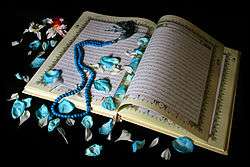Misbaha
A misbaḥah (Arabic: مسبحة), subḥah (Arabic:سبحة), tasbīḥ (Persian and Urdu), or tespih (Albanian, Turkish and Bosnian) is a string of beads which is often used by Muslims to keep track of counting in tasbih.[1]
The misbaḥah is also known as tasbīḥ (تسبيح)—not to be confused with tasbīḥ, a type of dhikr—in non-Arab Muslim regions, or subḥah in Arabic. In Turkey, the beads are known as tespih.[2]
Use
A misbaḥah is a tool which is used as an aid to perform dhikr, including the 99 Names of Allah, and the glorification of God after regular prayer.[3]
It is often made of wooden beads, but also of olive seeds, ivory, amber, pearls or plastic.
A misbaha usually consists of 99 beads (corresponding to the 99 Names of Allah), or sometimes 33 beads (in which case one cycles through them 3 times to equal 99).

History
It is thought that in the early Muslim era, loose pebbles were used or that people counted on their fingers.[4]
According to the 17th-century ʻAllāmah Muhammad Baqir Majlisi, after the Battle of Uḥud, Fāṭimah would visit the Martyrs' Graveyard every two or three days, and then made a misbaḥah of Ḥamzah ibn ʻAbd al-Muṭṭalib's grave-soil. After that, people started making and using misbaḥahs.
However some hadiths state the benefit of using the fingers of the right hand to count tasbīḥ.[5]
See also
Citations
- ↑ Netton, Ian Richard (2013-12-19). Encyclopedia of Islamic Civilization and Religion. Routledge. ISBN 9781135179670.
- ↑ Leone, Stacie (May 2006). "The Tespih Works in Mysterious Ways". Turkey Now. Retrieved 2007-09-02.
- ↑ Netton, Ian Richard (2013-12-19). Encyclopedia of Islamic Civilization and Religion. Routledge. ISBN 9781135179670.
- ↑ (Indonesian) Hadits Shafiyah binti Hayyi (isteri Rasulullah) yang berbunyi: عَنْ كِنَانَةَ مَوْلَى صَفِيَّةَ قَال سَمِعْتُ صَفِيَّةَ تَقُولُ دَخَلَ عَلَيَّ رَسُولُ اللَّهِ صَلَّى اللَّهُ عَلَيْهِ وَسَلَّمَ وَبَيْنَ يَدَيَّ أَرْبَعَةُ آلَافِ نَوَاةٍ أُسَبِّحُ بِهَا فَقَالَ لَقَدْ سَبَّحْتِ بِهَذِهِ أَلَا أُعَلِّمُكِ بِأَكْثَرَ مِمَّا سَبَّحْتِ بِهِ فَقُلْتُ بَلَى عَلِّمْنِي فَقَالَ قُولِي سُبْحَانَ اللَّهِ عَدَدَ خَلْقِهِ قَالَ أَبُو عِيسَى هَذَا حَدِيثٌ غَرِيبٌ لَا نَعْرِفُهُ مِنْ حَدِيثِ صَفِيَّةَ إِلَّا مِنْ هَذَا الْوَجْهِ مِنْ حَدِيثِ هَاشِمِ بْنِ سَعِيدٍ الْكُوفِيِّ وَلَيْسَ إِسْنَادُهُ بِمَعْرُوفٍ وَفِي الْبَاب عَنْ ابْنِ عَبَّاسٍ "Dari Kinanah budak Shafiyah berkata, saya mendengar Shafiyah berkata: Rasulullah pernah menemuiku dan di tanganku ada empat ribu nawat (bijian korma) yang aku pakai untuk menghitung dzikirku. Aku berkata,”Aku telah bertasbih dengan ini.” Rasulullah bersabda,”Maukah aku ajari engkau (dengan) yang lebih baik dari pada yang engkau pakai bertasbih?” Saya menjawab,”Ajarilah aku,” maka Rasulullah bersabda,”Ucapkanlah : سُبْحَانَ اللَّهِ عَدَدَ خَلْقِهِ. (Maha Suci Allah sejumlah apa yang diciptakan oleh Allah dari sesuatu).” (HR Tirmidzi, beliau berkata,”Hadist ini gharib. Saya tidak mengetahuinya, kecuali lewat jalan ini, yaitu Hasyim bin Sa’id Al Kufi.” Ibnu Hajar dalam kitab At Taqrib menyebutnya dhaif (lemah), begitu juga gurunya, Kinanah Maula Shafiyah didhaifkan oleh Al Adzdi.)
- ↑ Narrated Yusayrah, mother of Yasir: The Prophet (saw) commanded them (the women emigrants) to be regular (in remembering Allah by saying): "Allah is most great"; "Glory be to the King, the Holy"; "there is no god but Allah"; and that they should count them on fingers, for they (the fingers) will be questioned and asked to speak. (Book #8, Hadith #1496)
Bibliography
- Dubin, Lois Sherr (2009). "Prayer Beads". The History of Beads: From 100,000 B.C. to the Present (Rev. and expanded ed.). New York: Abrams. pp. 79–92. ISBN 9780810951747.
- Henry, Gray; Marriott, Susannah (2008). Beads of Faith: Pathways to Meditation and Spirituality Using Rosaries, Prayer Beads and Sacred Words. Louisville, Ky.: Fons Vitae. ISBN 9781887752954.
- Majlesi, Mohammad Baqer. Biḥār al-Anwār (in Arabic). 110. pp. 133, 64.
- Untracht, Oppi (2008). "Rosaries of India". Traditional Jewelry of India. New York: Thames & Hudson. pp. 69–73. ISBN 9780500287491.
- Wiley, Eleanor; Shannon, Maggie Oman (2002). A String and a Prayer: How to Make and Use Prayer Beads. Boston: Red Wheel/Weiser. ISBN 1590030109.
External links
- History of the Tasbih in Iran
- Muslim Prayer Beads
- Rosaries of India: Muslim Misbaha
- Souvenir Tasbih Cantik